Programme and Guests
Programme overview
The programme of our Symposium combines well-known attractions with a refreshing breath of innovation. Here is what we prepared for you in the forthcoming edition:
- ◘ 6+ outstanding Keynote Lectures of recognised researchers from all over Europe,
- ◘ 5+ Industry Lectures prepared by our partners – leaders in the biotechnology industry,
- ◘ 30+ Short Talks by the active participants,
- ◘ 2 Sessions of Poster presentations by the active participants,
- ◘ discussion panels/workshops in soft skills related to biotechnology,
- ◘ on-site coffee and lunch breaks ideal for informal conversations and networking,
- ◘ Warsaw sightseeing tour for interested participants
- ◘ evening integration events.
Visit this page and our social media 
 regularly as we will gradually reveal Keynote Lecturers, workshop topics, and integration events (among others)!
regularly as we will gradually reveal Keynote Lecturers, workshop topics, and integration events (among others)!
Meet our Keynote Lecturers!
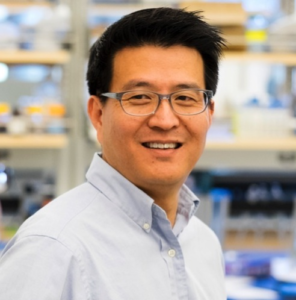
Prof. S. Michael Yu
Department of Biomedical Engineering,
University of Utah,
Salt Lake City, USA
Read BIO!
Michael Yu is a Professor of Biomedical Engineering, and Molecular Pharmaceutics at the University of Utah. Previously, he was an Associate Professor of Materials Science & Engineering at Johns Hopkins University. Dr. Yu is the recipient of the Presidential Early Career Award for Scientists and Engineers (PECASE) and NSF CAREER award. Dr. Yu received undergraduate degree in chemistry from Korea University in South Korea, followed by doctoral degree in polymer science and engineering from University of Massachusetts at Amherst. He was an NIH post-doctoral fellow at the Chemistry Department of University of Wisconsin-Madison before joining Johns Hopkins University. By applying principles of protein folding and assembly to bio- and nano-technology, Dr. Yu is developing innovative diagnostic/therapeutic molecules, biomaterials, and piezoelectric materials. In particular, the collagen hybridizing peptide he developed and commercialized (3Helix, Inc) is considered a breakthrough technology in detecting and studying damaged collagens associated with disease and injury. As an active member of NIH, Dr. Yu serves as a standing member for Biomaterials Biointerface (BMBI) study section, onsite institution reviews, and interagency research consortium for NIH.
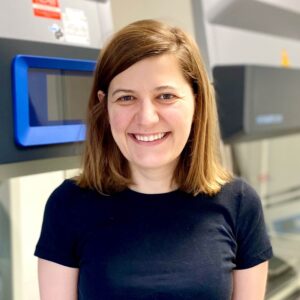
Dr. Aleksandra Kołodziejczyk
Laboratory of Cellular Genomics,
International Institute of Molecular and Cell Biology
Warsaw, Poland
Read BIO!
Ola completed an international first-level degree in Biotechnology run by a consortium of European Universities at the University of Perugia. During her studies she trained in the labs of Prof. Fred van Leuven (KU Leuven), Prof. Sir Alan Fersht (MRC LMB, Cambridge) and Prof. Matthias Wilmanns (EMBL). She completed her MSc Degree in Molecular Biosciences, majoring in Molecular and Cellular Biology at the University of Heidelberg. For her thesis, she worked on chemotaxis towards bacterial autoinducers in the lab of Prof. Victor Sourjik. In 2012 to pursue her PhD she joined the group of Dr. Sarah Teichmann at EMBL EBI and Wellcome Trust Sanger Institute and worked in the emerging field of single cell transcriptomics. She focused on technical aspects of the method as well as gaining novel biological insights into T cells and mouse embryonic stem cells. She was awarded by EMBO Long Term Fellowship and Marie Skłodowska-Curie Action Individual Fellowship to undertake Postdoctoral training at the Weizmann Institute of Science in the group of Prof. Eran Elinav, where she applied her genomics skills to study the role of host-microbiota interactions in liver diseases. She joined IIMCB as a team leader in April 2023 and she is establishing the Laboratory of Cellular Genomics, which employs cutting-edge ‘omics technologies to study host-microbiota interactions and gastrointestinal health.
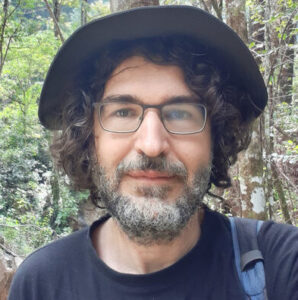
Prof. Lukaš Kratochvil
Department of Ecology,
Charles University
Prague, Czechia
Read BIO!
Lukáš Kratochvíl (1975) is a professor at Charles University in Prague, Czech Republic. He is interested in the reproductive strategies of vertebrates, his favourite group being reptiles. He is particularly interested in evolutionary transitions in sex determination, i.e. when and why an individual develops into a male or female, differences between the sexes and, more recently, the loss of sexual reproduction.
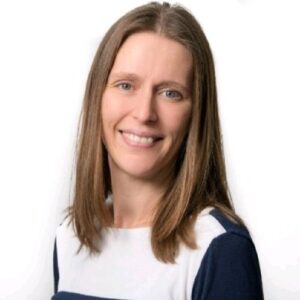
Dr. Dagmar Ehrnhöfer
Neuroscience Discovery,
AbbVie Deutschland GmbH & Co KG,
Ludwigshafen, Germany
Read BIO!
Dr. Dagmar Ehrnhoefer is a biochemist focussing on the molecular and cellular mechanisms of human neurodegenerative disease with the overarching goal of identifying pathways with therapeutic relevance.
Dr. Ehrnhoefer’s interest in neurodegenerative disease research started during her PhD at the Max-Delbrück Center for Molecular Medicine in Berlin, where she studied protein aggregation inhibitors in models of Alzheimer’s, Parkinson’s and Huntington’s disease. As a postdoctoral fellow and research associate at the University of British Columbia in Vancouver, Canada, Dr. Ehrnhoefer then had the opportunity to work with a large variety of collaborators in the pharmaceutical and biotechnology industries as part of our efforts to develop therapeutic strategies for Huntington’s disease. During this time, she learned to appreciate the complementary strengths both academic and industrial partners can bring to a project and gained first leadership experience. Dr. Ehrnhoefer’s next career step then took her to the BioMed X Innovation Center in Heidelberg, where she led a team that investigated the roles of Tau post-translational modifications (PTMs) in the pathogenesis of Alzheimer’s disease. After successful completion of the project term she took the opportunity to move to the Discovery Biology department at AbbVie GmbH & Co KG in Ludwigshafen, where she is currently employed as a Principal Research Scientist (head of laboratory). Dr. Ehrnhoefer’s team uses biochemical and cellular model systems as well as patient-derived materials to identify therapeutic approaches targeting Tau pathology in Alzheimer’s disease.
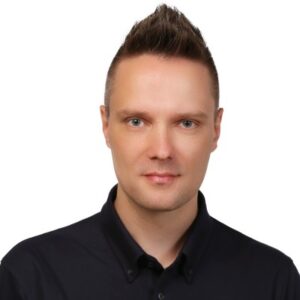
Dr. Wojciech Buła
Department of Bioengineering,
University of Tokyo, Japan /
Immunotronics, Warsaw, Poland
Read BIO!
Wojciech Piotr Buła possesses an unconventional background that blends the worlds of science, academia, business, and entrepreneurship. He is an innovative and results-driven leader, offering over 20 years of experience in the deep-tech and healthcare sectors. He is the co-founder and ex-CTO of Bisu, a US-Japanese healthcare start-up based in Tokyo, and an alumnus of HAX/SOSV accelerator, Batch 11, Shenzhen Campus, China. His career exemplifies the successful transformation of passion and scientific knowledge into concrete actions in business. Wojciech is a graduate of the Faculty of Electronics at Wrocław University of Technology. He has been involved in scientific work for most of his professional life. He obtained his PhD from the MESA+ Nanotechnology Institute at the University of Twente in the Netherlands. His research was interdisciplinary and focused on microfluidics, lab-on-a-chip analytical systems, microsystems electronics, integrated systems, IoT, MEMS, nanotechnology, chemistry, biology, environmental research and systems for smart agriculture. In addition, Wojciech has taught students and PhD students at various universities around the world, including the University of Twente, Hiroshima University, The University of Tokyo, Warsaw School of Economics. He authored and co-authored over 40 papers in peer-reviewed international journals and conference proceedings, and filed more than 20 patents. Through his work at Bisu, he has won many prestigious awards and accolades such as the Good Design Awards, UK Tech Rocketship Awards, Johnson & Johnson Innovation, MedTech Innovator, The Edison Awards and CES 2020 HIS Markit Innovation. As Chief Technology Officer at ImmunoTronics, Wojciech contributes to the development of cutting-edge medical technologies for early sepsis detection.

Prof. Anna Karnkowska
Department of Biology,
University of Warsaw, Poland
Read BIO!
Anna Karnkowska is an associate professor at the Faculty of Biology of the University of Warsaw, where she leads the Evolution and Genomics of Microbial Eukaryotes team and works as an academic teacher.
Her research focuses on the evolution of eukaryotic cells, the study of the diversity of microbial eukaryotes and the investigation of their interactions with other microorganisms, with symbiosis being a central theme. Her research interests include the origin and evolution of endosymbiotic organelles such as mitochondria and chloroplasts as well as the endosymbioses of various microbial eukaryotes. By unravelling the complexity of these relationships, she aims to deepen our understanding of endosymbiosis and its impact on ecosystem functioning. To achieve this, her team uses a multifaceted approach that includes sampling, cultivation, microscopy, sequencing and bioinformatics.
She highly values collaboration and diversity in science and considers teamwork to be one of the most rewarding aspects of her work. She is actively involved in organising scientific events and helping to build a community to promote scientific advancement and support other scientists. She is currently President of the International Society of Protistologists and has been recently recognized as a FEMS European Academy of Microbiology Fellow.
Conference timetable
The main scientific events of the Symposium will begin early afternoon 10 May, and will conclude in the afternoon 12 May. Detailed timetable will be announced after evaluation of student talks.